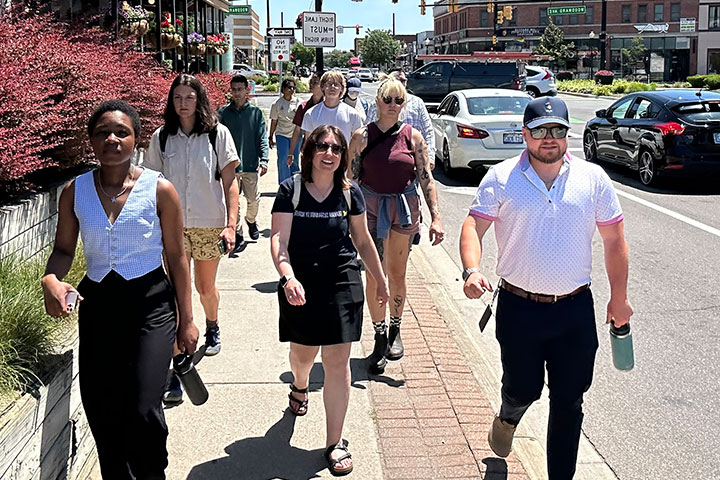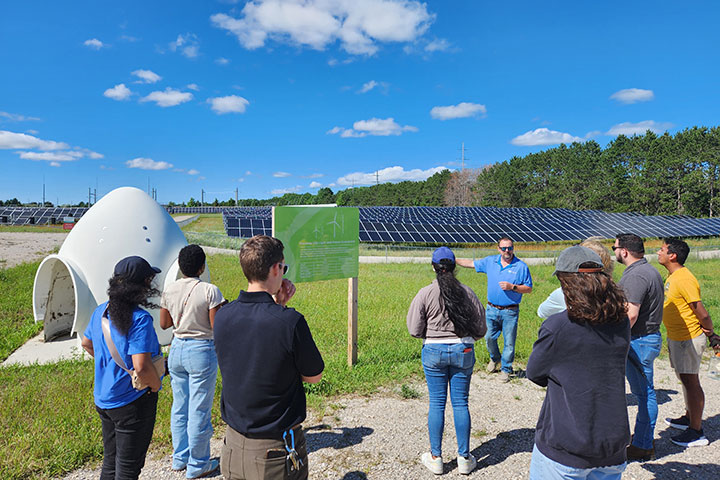The Catalyst Leadership Circle (CLC) Fellowship is now accepting applications for its Summer 2025 program, with a deadline of January 29, 2025. This unique opportunity, supported by the Michigan Department of Environment, Great Lakes, and Energy (EGLE), invites graduate students across Michigan to gain hands-on experience while advancing sustainability efforts in local communities. The summer fellowship program will run from May 19 to July 25, 2025, and is based in Ann Arbor.
Tailored to graduate students from all academic backgrounds, the program offers $6,000 in funding, along with a $1,500 stipend for housing and travel. This support allows Fellows to fully immerse themselves in projects and directly engage with local governments on sustainability initiatives. The work produced is designed to be scalable and transferrable, enabling communities across Michigan to apply the insights and solutions developed by the Fellows.

2024 CLC Fellows take to the streets of Ferndale to understand its communal waste collection program
The CLC Fellowship is recognized for helping cultivate the next generation of sustainability leaders. Participants come from a broad range of fields and disciplines, including urban planning, public policy, public health, environmental sustainability, and business, and represent institutions that include Michigan State University, Western Michigan University, Eastern Michigan University, Michigan Technological University, and the University of Michigan. Fellows work on diverse projects, addressing issues like energy efficiency, waste reduction, food systems, and climate resilience. They receive professional training and mentorship while contributing to Michigan’s broader goals for a sustainable future.
The Summer 2024 cohort of CLC Fellows led a variety of sustainability projects throughout Michigan, addressing challenges from urban forestry to energy efficiency. Their projects resulted in useful deliverables that other cities and towns can adopt to implement similar sustainability initiatives.

CLC Fellows visit a solar development operated by Traverse City Light & Power
Several projects focused on aspects of decarbonization, including energy coaching for households, life cycle assessments for building systems, fleet electrification, and using ArcGIS StoryMaps to highlight the benefits of urban trees. Fellows also developed a waste management toolkit for cities, worked on environmentally friendly pest management strategies, and contributed to food waste reduction and integrating sustainability staff into local governments. Other projects designed rain garden programs to mitigate flood risks and water management strategies for long-term sustainability.
All past projects provide replicable frameworks that local governments can implement to drive meaningful sustainability advancements. They also highlight the effectiveness of community-driven, data-informed solutions in creating a more sustainable path forward for Michigan.
Looking ahead to Summer 2025, upcoming projects will focus on innovative solutions. These include solar parking canopies, green stormwater infrastructure, and Michigan’s first school district-based composting program, all designed to support forward-thinking community priorities. Other projects will consider a regional recycling center, improvements in single-stream recycling, and a city-led micro-forest program that promotes environmental justice and restores green spaces. Fellows will also create sustainability curricula for municipal staff and use climate vulnerability tools to help cities prepare for future risks. Across the 2025 projects, community empowerment will remain a central priority.
The Catalyst Leadership Circle Fellowship reflects a vision shared among Fellows and local governments of a cleaner, more sustainable Michigan—one that integrates environmental health, social equity, and resilience for the long term.
An informational webinar will be held on Wednesday, January 15, at 12 p.m. for those interested in learning more about the program and the application process.